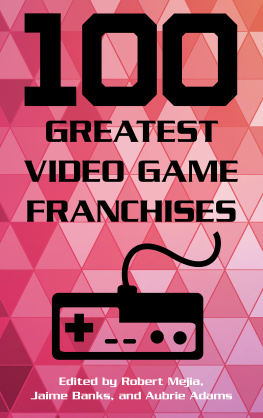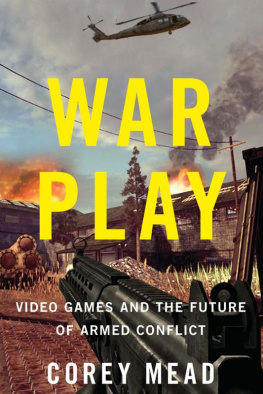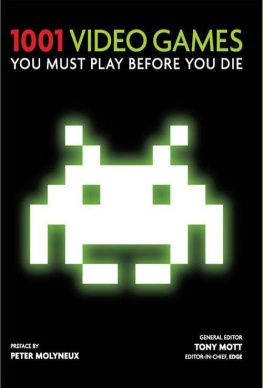
Joystick Soldiers
Joystick Soldiers is the first anthology to examine the reciprocal relationship between militarism and video games. War has been an integral theme of the games industry since the invention of the first video game, Spacewar! in 1962. While war video games began as entertainment, military organizations soon saw their potential as combat simulation and recruitment tools. A profitable and popular relationship was established between the video game industry and the military, and continues today with video game franchises like Americas Army, which was developed by the U.S. Army as a public relations and recruitment tool.
This collection features all new essays that explore how modern warfare has been represented in and influenced by video games. The contributors explore the history and political economy of video games and the military-entertainment complex; present textual analyses of military-themed video games such as Metal Gear Solid; and offer reception studies of gamers, fandom, and political activism within online gaming.
This volume is essential reading for anyone interested in the relationship between war and media, and it sheds surprising light on the connections between virtual battlefields and the international conflicts unfolding around the globe.
Nina B. Huntemann is Associate Professor of Communication and Journalism at Suffolk University in Boston, Massachusetts. She produced and directed the documentary film Game Over: Gender, Race, and Violence in Video Games, distributed by the Media Education Foundation.
Matthew Thomas Payne is a Media Studies doctoral candidate at the University of Texas at Austin. He has served as a coordinating editor for FlowTV (www. flowtv.org), a critical forum for television and new media culture, and is a co-editor of the anthology Flow TV: Television in the Age of Media Convergence (Routledge, forthcoming).
Joystick Soldiers
The Politics of Play in Military Video Games
Edited by Nina B. Huntemann and Matthew Thomas Payne
LONDON AND NEW YORK
First published 2010
by Routledge
270 Madison Ave, New York, NY 10016
Simultaneously published in the UK
by Routledge
2 Park Square, Milton Park, Abingdon, Oxon OX14 4RN
Routledge is an imprint of the Taylor & Francis Group, an informa business
This edition published in the Taylor & Francis e-Library, 2009.
To purchase your own copy of this or any of Taylor & Francis or Routledges collection of thousands of eBooks please go to www.eBookstore.tandf.co.uk.
2010 Taylor & Francis
All rights reserved. No part of this book may be reprinted or
reproduced or utilised in any form or by any electronic,
mechanical, or other means, now known or hereafter invented,
including photocopying and recording, or in any information
storage or retrieval system, without permission in writing from
the publishers.
Trademark Notice: Product or corporate names may be
trademarks or registered trademarks, and are used only for
identification and explanation without intent to infringe.
Library of Congress Cataloging in Publication Data
A catalog record has been requested for this book
ISBN 0-203-88446-9 Master e-book ISBN
ISBN10:0415996597 (hbk)
ISBN10:0415996600 (pbk)
ISBN10:0203884469 (ebk)
ISBN13:9780415996594 (hbk)
ISBN13:9780415996600 (pbk)
ISBN13:9780203884461 (ebk)
Copyright 2008/2009 Mobipocket.com. All rights reserved.
Reader's Guide
This ebook has been optimized for MobiPocket PDA.
Tables may have been presented to accommodate this Device's Limitations.
Table content may have been removed due to this Device's Limitations.
Image presentation is limited by this Device's Screen resolution.
All possible language characters have been included within the Font handling ability of this Device.
Contents
NINA B. HUNTEMANN AND MATTHEW THOMAS PAYNE
SEBASTIAN DETERDING
RANDY NICHOLS
DAVID B. NIEBORG
NINA B. HUNTEMANN AND MATTHEW THOMAS PAYNE
SCOTT A. LUKAS
C. RICHARD KING AND DAVID J. LEONARD
JOSH SMICKER
MATTHEW THOMAS PAYNE
DAN LEOPARD
JEFFREY LESER AND JAMES STERRETT
ELIZABETH LOSH
NINA B. HUNTEMANN
JOEL PENNEY
MATHEW THOMAS PAYNE
NINA B. HUNTEMANN
IRENE CHIEN
TANNER HIGGIN
DEAN CHAN
Figures and Tables
Figures
Tables
Foreword
Ian Bogost
We most often think of video games as an entertainment medium, one meant for leisure, distraction, or release. But there are other ways of understanding this medium. And as I argued in my book Persuasive Games, video games can make or express ideas by constructing models of how things workor how they might work better, or differently. I called this type of argument procedural rhetoric, arguments built by modeling rules and behaviors rather than through words or images. Working under such a mode, todays games also serve many other purposes, from enforcing an exercise regime (Wii Fit) to crafting empathy for refugees (Darfur is Dying) to advertising hamburgers (Burger Kings Sneak King)to educating potential recruits about army policies (Americas Army). How did we arrive at such a place? Lets consider the question by analogy.
History tells us that writing was born from the loins of commerce. In the fourth millennium BCE, people of the Near East used clay objects or tokens to count commodities, resources, and time as a kind of ledger, in much the same way that modern players of boardgames use tokens to represent units and resources. These tokens influenced the development of a more formal writing system, cuneiform, which appeared first in ancient Sumer by the early third millennium. By inscribing with sharpened reed into clay tablets that were later fired or sundried, the Sumerians used cuneiform to track agricultural trade, to mark property ownership, and to keep transactional and supply records.
Originally pictographic, this system would develop over the next two thousand years into a complex, general, syllabic writing system used in half a dozen languages, including Akkadian, Babylonian, and Hittite. As video games evolved from tools of leisure to tools of education, industry, and art, writing did as well. Cuneiform expanded its function from accounting to other uses: first ceremonial inscription on gravestones and monuments; then records and histories of governmental, religious, and social practice; then education, specifically that of the scribal schools that taught inscription itself; then, eventually, hymns, myths, and one of the earliest known works of literature, the Epic of Gilgamesh.
The origins of other media can be discussed in similar terms. We dont fully understand the purpose of prehistoric cave and rock paintings, but their uses seem to have been ceremonial. Religious and cult applications have remained an important use of painting up through the present, although many other uses have emerged, from self-expression to advertising. Yet as history has progressed, the functional origins of new media become more complex. Film serves purposes similar to painting and theater, forms with histories millennia old themselves, but it also owes much to photography and industrial machinery, much newer practices which had already been put to use in far more varied ways than had writing at the time of Babylon.
Next page
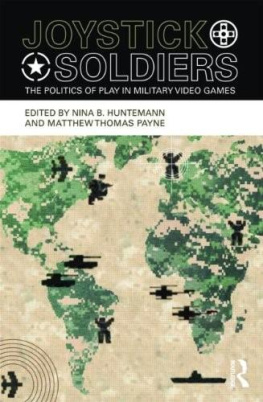


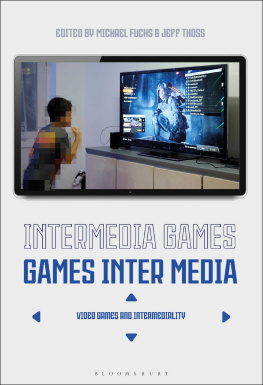


![Mark J. P. Wolf (editor) - Encyclopedia of Video Games: The Culture, Technology, and Art of Gaming [3 volumes]](/uploads/posts/book/279290/thumbs/mark-j-p-wolf-editor-encyclopedia-of-video.jpg)

